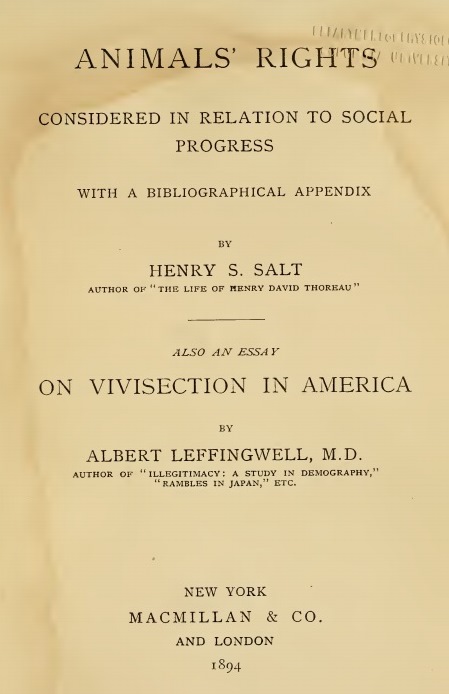Animals' Rights
 Animals' Rights refers to the idea that non-human animals are entitled to the possession of their own lives and that their most basic interests—such as the need to avoid suffering—should be afforded the same consideration as similar interests of human beings. Advocates of animals' rights argue that animals have the ability to suffer and feel pain in a way that is similar to humans, and therefore, should not be used as food, clothing, research subjects, or entertainment.
Animals' Rights refers to the idea that non-human animals are entitled to the possession of their own lives and that their most basic interests—such as the need to avoid suffering—should be afforded the same consideration as similar interests of human beings. Advocates of animals' rights argue that animals have the ability to suffer and feel pain in a way that is similar to humans, and therefore, should not be used as food, clothing, research subjects, or entertainment.
History[edit | edit source]
The concept of animals' rights has evolved over centuries, with notable philosophers and activists contributing to its development. The idea can be traced back to ancient philosophies in both the East and West, but it gained significant momentum in the 19th century with the emergence of the first societies for the prevention of cruelty to animals, such as the Royal Society for the Prevention of Cruelty to Animals (RSPCA) founded in the UK in 1824. In the 20th century, the publication of Peter Singer's "Animal Liberation" in 1975 served as a pivotal moment, propelling the animals' rights movement into the mainstream and sparking widespread debate on the issue.
Philosophical Foundations[edit | edit source]
The philosophical underpinnings of animals' rights are primarily rooted in the principle of Utilitarianism, which argues for the greatest good for the greatest number, and the belief that animals' capacity to suffer grants them the right to be considered in moral decision-making. Other philosophical perspectives include Deontological ethics, which posits that animals have intrinsic value and rights independent of their utility to humans, and Ecofeminism, which links the exploitation of animals to the broader context of oppression within society.
Legal and Ethical Considerations[edit | edit source]
The legal recognition of animals' rights varies significantly around the world. Some countries have enacted laws to protect animals from cruelty and exploitation, but these laws often fall short of granting animals full rights akin to those of humans. Ethical debates surrounding animals' rights include discussions on the morality of eating animals, using them in scientific research, and their use in entertainment and as pets.
Current Issues and Activism[edit | edit source]
Activists and organizations advocating for animals' rights employ a variety of strategies, from legal challenges and legislative advocacy to public awareness campaigns and direct action. Key issues in the movement include factory farming, animal testing, fur farming, and the use of animals in entertainment, such as circuses and zoos.
Criticism[edit | edit source]
Critics of animals' rights often argue that extending rights to animals undermines human exceptionalism and could lead to excessive restrictions on human activities. Others contend that the focus should be on animal welfare—ensuring humane treatment—rather than on granting animals rights that are equivalent to human rights.
See Also[edit | edit source]
Search WikiMD
Ad.Tired of being Overweight? Try W8MD's physician weight loss program.
Semaglutide (Ozempic / Wegovy and Tirzepatide (Mounjaro / Zepbound) available.
Advertise on WikiMD
|
WikiMD's Wellness Encyclopedia |
| Let Food Be Thy Medicine Medicine Thy Food - Hippocrates |
Translate this page: - East Asian
中文,
日本,
한국어,
South Asian
हिन्दी,
தமிழ்,
తెలుగు,
Urdu,
ಕನ್ನಡ,
Southeast Asian
Indonesian,
Vietnamese,
Thai,
မြန်မာဘာသာ,
বাংলা
European
español,
Deutsch,
français,
Greek,
português do Brasil,
polski,
română,
русский,
Nederlands,
norsk,
svenska,
suomi,
Italian
Middle Eastern & African
عربى,
Turkish,
Persian,
Hebrew,
Afrikaans,
isiZulu,
Kiswahili,
Other
Bulgarian,
Hungarian,
Czech,
Swedish,
മലയാളം,
मराठी,
ਪੰਜਾਬੀ,
ગુજરાતી,
Portuguese,
Ukrainian
Medical Disclaimer: WikiMD is not a substitute for professional medical advice. The information on WikiMD is provided as an information resource only, may be incorrect, outdated or misleading, and is not to be used or relied on for any diagnostic or treatment purposes. Please consult your health care provider before making any healthcare decisions or for guidance about a specific medical condition. WikiMD expressly disclaims responsibility, and shall have no liability, for any damages, loss, injury, or liability whatsoever suffered as a result of your reliance on the information contained in this site. By visiting this site you agree to the foregoing terms and conditions, which may from time to time be changed or supplemented by WikiMD. If you do not agree to the foregoing terms and conditions, you should not enter or use this site. See full disclaimer.
Credits:Most images are courtesy of Wikimedia commons, and templates, categories Wikipedia, licensed under CC BY SA or similar.
Contributors: Prab R. Tumpati, MD

